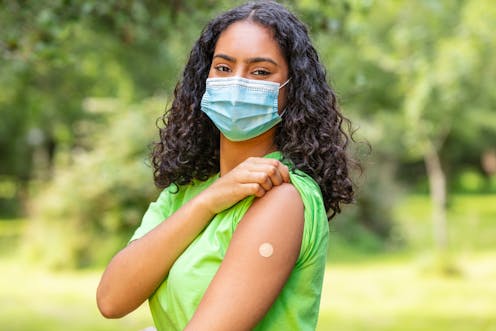
Adolescents aged 16-17 are now eligible to receive their Pfizer vaccine booster, following the recommendation earlier this week from the Australian Technical Advisory Group on Immunisation (ATAGI).
This move has been prompted by the rise of Omicron and reduced immunity after two vaccine doses.
It’s also the next step in the likely future expansion of booster doses to younger adolescents.
Here’s what you need to know before booking your 16-17 year old for their booster, and why younger children are not yet eligible.
What’s been recommended?
ATAGI’s recommendation to extend Pfizer booster doses to 16-17 year olds this week follows regulatory approval from the Therapeutic Goods Administration (TGA) in late January.
This means an estimated 370,000 Australians aged 16-17 are eligible to receive their Pfizer booster vaccine from three months after their second dose.
Presently, the Pfizer vaccine is the only one registered as a booster for this age group.
Those under 16 when they received their second dose but have since turned 16 are also eligible.
Those 16-17 year olds who are severely immunocompromised – for instance, with weakened immune systems due to cancer treatment – are recommended to have three primary doses, and three months later, have their booster (fourth) dose.
Read more: If my child or I have COVID, when can we get our vaccine or booster shot?
Why Omicron changes things
The more transmissible Omicron variant can still infect people who have already been infected with SARS-CoV-2 (the virus that causes COVID), or who have had two vaccine doses.
For the vast majority of older adolescents, these so-called breakthrough infections are mild and very unlikely to lead to hospitalisation.
Data from New South Wales during the Omicron period (November 26, 2021 to January 15, 2022) shows of 71,786 PCR-confirmed cases in adolescents (aged 10-19 years) only 191 cases (under 1%) required hospitalisation.
Then there’s the issue of waning immunity following the initial two doses.
Real-world data from adults in the United Kingdom shows four months after two Pfizer doses there is modest protection against Omicron infection (vaccine effectiveness 0-34%).
However, a Pfizer booster dose quickly improves protection against Omicron. Vaccine effectiveness increases to 54-76% within two to four weeks after a booster.
It is important to note that studies of the effectiveness of booster doses specifically in adolescents aged 16-17 against Omicron are not yet available. However, this is likely to be comparable to that for young adults.
The booster dose has several aims. It not only reduces the chances of getting infected in the first place, it reduces the severity of infection in an individual if they do. This means people are less likely to have to take time off school or work.
Adolescents are also a very mobile social group and there may be a potential benefit of a booster vaccine in reducing community transmission. If a booster vaccine reduces your chances of infection it follows it could then reduce community transmission. But more research is needed to confirm if this occurs for Omicron.
How safe are boosters for adolescents?
Safety data from the United States indicates Pfizer booster doses in adolescents have a similar profile to that seen after a Pfizer second dose.
Early data on booster doses from Australia’s active safety surveillance system also supports the safety of a Pfizer booster dose in adults. In over 600,000 surveys, the most common reported reactions include pain, redness and swelling at the injection site, tiredness, headache and muscle aches.
We also know that both Pfizer (and Moderna) COVID-19 vaccines have rarely been associated with myocarditis, a treatable inflammation of the heart.
In studies in the US, the estimated myocarditis rate in young males aged 16-17 after the second Pfizer dose was 6.9 per 100,000 doses.
Australian data from the TGA show estimated rates of likely myocarditis in males aged 12-17 years of 10.9 per 100,000 doses after the second dose of Pfizer vaccine.
As the booster vaccine program rolls out to 16-17 year olds, the TGA and state/territory health departments will closely monitor any adverse events.
Read more: COVID vaccines have been developed in record time. But how will we know they're safe?
Why can’t younger kids get their booster?
The US now recommends booster doses for everyone aged 12 and older, from five months after the second dose.
It is likely Australia will also see a recommendation for booster doses in younger adolescents (12-15 year olds) and potentially younger children (5-11 year olds) in the future.
However, for now, our focus is on rolling out the two primary doses in 12-15 year olds before considering any booster doses in this age group.
In the meantime, Australia will be closely monitoring data from the US and other countries before expanding the booster program to younger children. This will include:
safety data, with a focus on the risk of myocarditis
looking at the best interval between primary and booster doses
effectiveness data, with a focus on breakthrough infections and their severity.
Pfizer, or other vaccine manufacturers, would need to seek regulatory approval for boosters in younger age groups, and provide safety and effectiveness data.
Australia would also closely watch for the emergence of any new viral variants when considering the need to expand the booster program.
Nicholas Wood has received funding from the NHMRC for a Career Development Fellowship. He holds a Churchill Fellowship awarded in 2019.
This article was originally published on The Conversation. Read the original article.





